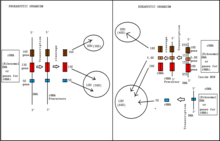
Ribosome biogenesis is the process of making ribosomes. In prokaryotes, this process takes place in the cytoplasm with the transcription of many ribosome gene operons. In eukaryotes, it takes place both in the cytoplasm and in the nucleolus. It involves the coordinated function of over 200 proteins in the synthesis and processing of the three prokaryotic or four eukaryotic rRNAs, as well as assembly of those rRNAs with the ribosomal proteins. Most of the ribosomal proteins fall into various energy-consuming enzyme families including ATP-dependent RNA helicases, AAA-ATPases, GTPases, and kinases.[1] About 60% of a cell's energy is spent on ribosome production and maintenance.[2]
Ribosome biogenesis is a very tightly regulated process, and it is closely linked to other cellular activities like growth and division.[3][4]
Some have speculated that in the origin of life, ribosome biogenesis predates cells, and that genes and cells evolved to enhance the reproductive capacity of ribosomes.[5]
- ^ Kressler, Dieter; Hurt, Ed; Babler, Jochen (2009). "Driving ribosome assembly" (PDF). Biochimica et Biophysica Acta (BBA) - Molecular Cell Research. 1803 (6): 673–683. doi:10.1016/j.bbamcr.2009.10.009. PMID 19879902.
- ^ Krista Conger (June 26, 2017). "Newly identified process of gene regulation challenges accepted science, researchers say". Inside Stanford Medicine. Vol. 9, no. 12. Stanford University.
- ^ Thomson, Emma; Ferreira-Cerca, Sebastien; Hurt, Ed (2013). "Eukaryotic ribosome biogenesis at a glance". Journal of Cell Science. 126 (21): 4815–4821. doi:10.1242/jcs.111948. PMID 24172536.
- ^ Lu T, Stroot PG, Oerther DB (2009). "Reverse transcription of 16S rRNA to monitor ribosome-synthesizing bacterial populations in the environment". Applied and Environmental Microbiology. 75 (13): 4589–4598. Bibcode:2009ApEnM..75.4589L. doi:10.1128/AEM.02970-08. PMC 2704851. PMID 19395563.
- ^ Root-Bernstein, Meredith; Root-Bernstein, Robert (21 February 2015). "The ribosome as a missing link in the evolution of life". Journal of Theoretical Biology. 367: 130–158. doi:10.1016/j.jtbi.2014.11.025. PMID 25500179.